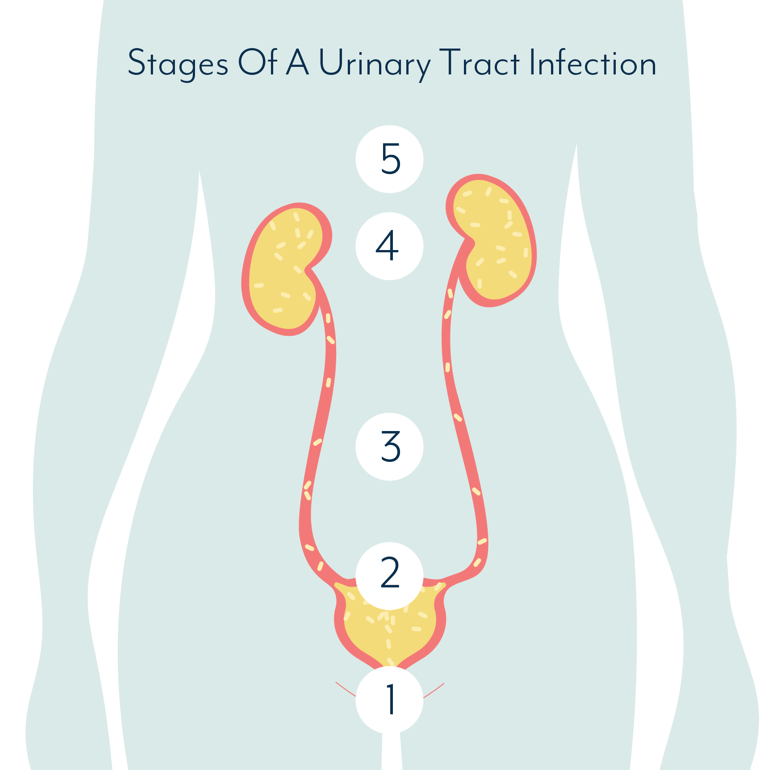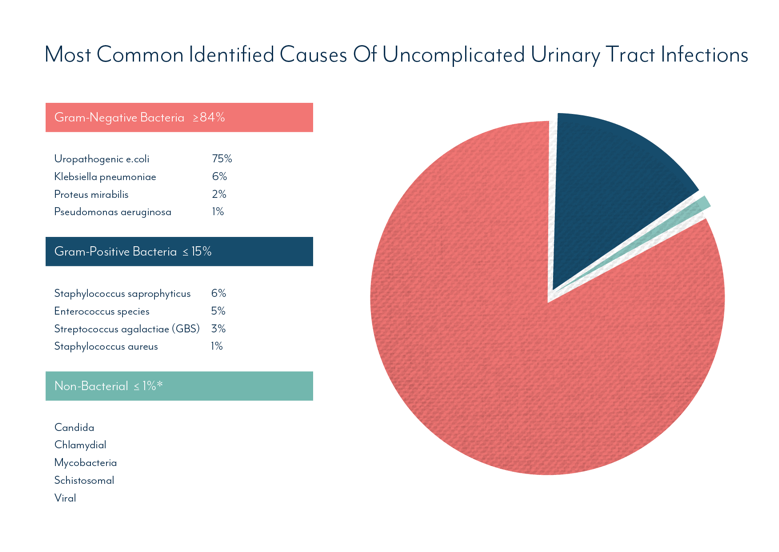What Causes A Urinary Tract Infection?
Jump To Section:
- UTI statistics: you’re not alone. >>>>
- What exactly is a urinary tract infection? >>>>
- What causes UTIs: stages of infection to be aware of. >>>>
- UTI symptoms. >>>>
- The most common causes of UTI, and when to see a doctor. >>>>
The question of what causes a urinary tract infection is not at all an easy one to answer.
That’s because what causes a UTI in one person can be very different from the next.
We want to start by making an important clarification here: whatever you think you may have done to get a UTI (whether you think it’s related to health, sex, diet, etc.), is not what is causing the infection itself.
So what is the actual cause?

A urinary tract infection, like any other infection, refers to the invasion and multiplication of one or more pathogens that are not normally present within your urinary tract. The urinary tract is made up of the urethra, bladder, ureters and kidneys, and an infection can be in one or more of these (see our diagram below).
Remember: The pathogens causing an infection in your urinary tract can be very different from the pathogens causing a UTI in someone else. We’ll go into more detail on pathogens later.
Our primary focus here at Live UTI Free is persistent UTIs, the kind that keep coming back.
In fact, we’ve been interviewing females from around the world about their experiences with recurrent UTIs, and much of the information in this site has sprung from those interviews.
But don’t stop reading if this is your first UTI, it’s really important to understand how a simple UTI can escalate, and what you should do if you find yourself in that situation.
Everything you’ll read below is about uncomplicated UTIs. Think of it as UTI basics – a foundation of knowledge that is essential to understand before we delve into what causes UTIs to become recurrent.
You may already know a bunch of this, so this is a great opportunity to brush up. One thing you may not know, is just how many people get UTIs. It’s a lot…
UTI Statistics: You’re Not Alone
Suffering from UTIs can feel isolating, and the pain can be debilitating. But once you start talking about it, you’re likely to find friends who know exactly what you’re going through.
This is our goal at Live UTI Free. To open up the conversation, and to empower sufferers of recurrent UTIs to find better information, get better testing, and know they are not alone.

“I’ve had UTIs since I was 7. I didn’t really want to talk to anyone about it but they got so bad I eventually I broke and told everyone. Amazingly, a bunch of my friends had had UTIs too, or knew others who had!”
How Many People Get UTIs?
- > 404 million people get a UTI each year across the globe
- UTI is the most common adult bacterial infection globally
- 10.5 million people get a UTI each year in the USA
- 85% of all UTI diagnoses are in females
- 50% of all females will get a UTI in their lifetime
- $1.6 billion spent annually on UTI healthcare in the USA alone
- UTI is the most common Emergency Department primary diagnosis for females
These are some pretty huge numbers. But where do recurrent UTIs fit in? We have a whole section about that.
While there are many theories around why some people are more prone to UTIs than others, there is no consensus as of yet.
Anecdotal evidence suggests there are some lifestyle tweaks that can give you a better shot at preventing future UTIs. And new research is emerging around things you can do to support your urinary tract health. This is why we’ve covered a broad range of tips in our article on how to prevent UTI.
If you already have a UTI, it is likely a microorganism, also known as a pathogen, is present in your urinary tract. And if your UTIs are recurrent, in order to properly treat the issue, you need to know which specific pathogen you’re dealing with.
This is what we mean when we talk about what causes a urinary tract infection – which pathogen or pathogens have made their way into your urinary tract to cause an infection.
Don’t Let Anyone Tell You Frequent UTIs Are Normal
Although UTIs are often dismissed by the healthcare industry as minor and easily treatable, we should NOT allow ourselves to get to the point where we perceive recurrent UTIs as normal, or ‘just the way we are.’
 | “I would ask my doctors, ‘what causes a urinary tract infection to keep coming back?’ I kept being told I was just prone to UTIs, or it was ‘just my plumbing.’ I haven’t always had UTIs. So did my ‘plumbing’ change? Why should I suddenly accept this as part of my life?” |
Recurrent UTIs are infections that can and should be treated.
We should approach them as we would any other kind of infection – by pursuing appropriate testing to find the reason they continue to occur, and following this through to a logical conclusion: effective treatment.
 | “If a urine dipstick or lab test comes back negative but the patient is clearly describing symptoms of a UTI, doctors must listen to them. Urine tests are far from perfect and it is vital to interpret them in the context of the patient’s symptoms.” |
 | If you ask your practitioner what causes a urinary tract infection, and you get an answer that points to your own habits, ask again. Ask how they can help you identify what pathogen is behind your infection, and how you can find the right treatment. |
Our bodies, when healthy, are designed to fight infection. For people with recurrent UTIs, this mechanism has some obstacles to overcome.
To understand why this is the case, it’s essential to understand what a UTI is, and why it can recur. Only then, can we begin to understand how to pursue a permanent cure.
So bear with us while we fill in the gaps, and provide you with a more complete picture. You can skim through the parts you already know. By the end we hope you can confidently discuss what causes a urinary tract infection, and move forward with getting to the bottom of your own issue.
What Is A Urinary Tract Infection?
First, let’s clear up a few things. You might hear a lot of different terms that relate to the urinary tract. There are many words that refer to infections in individual parts of the urinary tract, but in essence, they are all urinary tract infections.

A UTI is any infection in any part of the urinary tract.
We always like to start at the beginning. So here goes with our explanation of the urinary tract and what causes a urinary tract infection in the first place…
You probably recognize your kidneys as those two bean-shaped organs either side of your spine. They’re essential for removing excess water, potassium, salt, urea and other substances from your blood as it filters through. You can consider these substances waste products that exit your body in the form of urine.
The spaghetti-shaped tubules running from your kidneys to your bladder are ureters. They ship that urine out of your kidneys as it builds up.
The urine arrives in your bladder, and we all know where that is. Our bladder lets us know when it’s full, in no uncertain terms. For a small, balloon-shaped organ, it sure takes up a significant psychological chunk of the pelvic area.
Last but not least is the urethra, the final frontier of the urinary tract, through which urine exits the bladder. The urethra in females is far shorter than that of males – for males it has to pass through the prostate and the penis.
The shortness of the female urethra is believed to be one of the reasons females are substantially more prone to UTIs than males.
UTIs can involve the urethra, bladder or kidneys. Take a look at how it happens…
What Causes UTIs: Stages Of Infection

- Urethra is contaminated by a pathogen which colonizes before moving towards the bladder.
- Pathogen penetrates and colonizes bladder, causing an inflammatory response and damage to the bladder lining. If left untreated, a chronic bladder infection can form.
- Pathogen ascends via the ureters to the kidneys, causing pyelonephritis (kidney infection)
- Toxins produced by colonization of the kidneys cause acute kidney damage
- In severe cases, bacteria crosses the cell barrier to enter the blood, otherwise known as bacteraemia or sepsis
You can begin to feel symptoms at any stage of this process. While symptoms tend to escalate as the infection ascends your urinary tract, your symptoms may differ from the next person.
Explore our expert video series to learn more about how bacteria colonize and lead to an infection.
And now a quick set of UTI definitions to shed some light on the above…
 | Colonization has exactly the same meaning for bacteria as it does for humans, as in, the process by which a species establishes itself before spreading to new areas. |
 | While the symptoms for both can be very similar, urethritis is an inflammation of the urethra and cystitis is an inflammation of the bladder. |
 | Pyelonephritis, on the other hand, is an inflammation of the kidneys. Don’t ignore symptoms like fever, chills, nausea, vomiting, back, side and groin pain, or frequent painful urination. |
 | An uncomplicated UTI, which is the only type this site deals with, is considered to be an infection in a healthy patient who has no structural or functional abnormality in the urinary tract. Males, pregnant females, and in some cases, postmenopausal females, are automatically excluded from this category. |
 | A complicated UTI is, well, more complicated. This typically refers to an infection associated with an anatomic or functional abnormality of the urinary tract, a compromised immune system, or multi-drug resistant bacteria, among other criteria. |
Recurrent UTIs (persistent), chronic cystitis and conditions such as Interstitial Cystitis and Painful Bladder Syndrome fall into a bit of gray area, as they are generally diagnosed when there is no anatomical abnormality, but the suspected infection does not respond to the normal treatment approach for an uncomplicated UTI. We’ll cover more on this in the following sections.
Urinary Tract Infection Symptoms
Lower Urinary Tract Infection Symptoms: Urethra And Bladder
- Blood in urine (hematuria)
- It hurts to pee (dysuria)
- Burning during urination
- Difficulty urinating (stranguria)
- Your urine smells bad
- Cloudy urine
- Needing to pee frequently
- Urinary incontinence
- Lower abdominal pain
- Lower back pain
- Weird feelings or pain in the pelvic region
- It hurts to have sex
- Irritated urethra
- Unusual discharge
Upper Urinary Tract Infection Symptoms: Kidneys
- Upper back pain
- Side pain
- Nausea
- Vomiting
- Fever, chills or the shakes
Infections of the upper urinary tract can be life threatening if bacteria pass from an infected kidney into the blood. So again, don’t ignore symptoms of a UTI, they may not go away on their own.
Chronic Urinary Tract Infection Symptoms
- Frequent urination
- Bloody or dark urine
- A burning or painful sensation while urinating (dysuria)
- Kidney pain
- Pain in your bladder region
- Pain radiating to genitals
- Pain radiating to legs
- A constant urge to go to the bathroom (urgency)
- Premenstrual aggravation of symptoms
- Loin pain
- Urethral pain
 | “My UTIs often seem to get worse right when I’m about to get my period. A few times I’ve had one at the same time as my period, which is pretty horrendous. In between flare ups I almost always feel like I need to go to the bathroom. I’m rarely without symptoms.” |
These are just a few of the long list of documented symptoms that could indicate a chronic UTI. We’ve also put together a more comprehensive list of chronic UTI symptoms.
Do I Have A UTI?
Now that we’ve covered what causes UTIs, how do you know if you really have one?
The symptoms below are common signs of a UTI. But if you have a vagina and/or friends with a vagina, you might be familiar with these and know that some can also be caused by yeast infections, bacterial vaginosis, and other common issues.
For this reason alone, it’s really important to get tested. We have a whole section on UTI testing, so you can find out more there.
After months or years of recurrent UTI, you can generally be fairly confident in reading your symptoms. What you may not know is that these symptoms can, on rare occasions, be an indication of a much more serious issue.
You need to be sure what is causing your symptoms before you try to treat them. If you’re concerned, go see a doctor!
The Most Common Causes Of Urinary Tract Infections
Most UTIs are caused by bacteria. But you may be interested to know that while E.coli is the most common, it is certainly not the only culprit.
In fact, new testing methods based on molecular technology are showing that E.coli may be much less prominent in urinary tract infections than we think.
In the USA, it is currently believed the breakdown of what causes UTIs looks like this:

**It is generally believed non-bacterial UTIs are more likely to occur in people with compromised immune systems.
This is an estimated breakdown based on various sources and studies. But researchers may have to drastically reassess assumptions, as a recent review of 11,000 urine samples using molecular testing found E.coli DNA in just 40% of the samples.
On top of that, DNA of 1200 individual microbial species was detected. Obviously, that’s substantially more than we’ve shown here.
Now for a quick lesson on Gram-positive and Gram-negative bacteria. It sounds science-y, and, well, it is, but it’s also cool.
First, ‘Gram’ is the last name of a Danish physician who developed a technique of staining bacteria with violet dye to differentiate between two distinct types. It has nothing to do with weight.
Gram-positive bacteria retain a blue or purple colour after the test, while Gram-negative bacteria do not, and are instead red or pink. You can find some really pretty pictures online.
This process is called Gram staining, and it is extremely useful in distinguishing bacteria into two broad groups, as well as providing information on the shape, size and relative quantity of bacteria.
We mention the difference here, because these two broad groups of bacteria respond differently to treatment. Gram-negative bacteria have a relatively impermeable cell wall and are more resistant to antibodies and antibiotics than Gram-positive bacteria.
It’s also important to mention that there are many classes of antibiotic, and each works via a particular mechanism. Some are effective for a broad range of bacteria, others are effective on just a few.
Take another look at that diagram above. Two things should now be clear:
- Most UTIs are caused by the harder-to-treat kinds of bacteria
- UTIs are caused by many different pathogens, and you need to find the right treatment
The above overview of what causes UTIs is an estimate only, and there are a few reasons for this.
Why We Don’t Know What Causes Most UTIs
First, over time the percentages of UTIs caused by particular pathogens change as specific organisms become more prevalent. And new UTI-causing pathogens are identified frequently.
Second, the data just doesn’t exist.
It is quite common practice not to conduct a lab culture test of a urine sample in the case of a first UTI, or in the case of a UTI that is not considered to be a recurrence.
It is also quite common practice not to conduct a lab test in the case of recurrent UTIs. People in this situation are frequently prescribed antibiotics or have their prescription called in to their pharmacy, without lab testing.
When a lab test is conducted, it follows a standard procedure that has been proven to be extremely flawed. In reality, standard testing fails to detect up to 50% of UTIs. Some sources even suggest it’s possible that current UTI testing methods can only detect around 1% of potential urinary pathogens.
That means even standard testing labs can be a little iffy on what causes a urinary tract infection. We’ll go into this issue in detail in our UTI testing section.
Without accurate testing it is impossible to identify which pathogen is causing a UTI. That’s a significant amount of missing information, and as you’ll soon discover, a huge contributor to the global problem of recurrent UTI.
As for the information we do have, let’s put it in perspective…
Statistics for the USA show that UTIs account for more than 10 million physician visits per year, with 85% of these by females. The above breakdown in real numbers would look like this:

Again, this is based on the data available. Data that we believe to be significantly incomplete. But it should be quite clear now that even with limited data, all UTIs are not the same.
And why is this important?
There is no single antibiotic that cures all types of UTIs.
Antibiotics are specific to the bacteria they target and you cannot just interchange one antibiotic for another. If you’re one of the small number whose UTIs have a non-bacterial cause, antibiotics certainly won’t help.
The right treatment for your UTI can only be accurately selected if you know which pathogen caused your UTI in the first place. And there can be more than one pathogen at play.
 | “I had been given the same antibiotic three times, but my UTI symptoms kept returning. Finally I had a test done. It showed my UTI was caused by a different kind of bacteria, and as soon as I started my new antibiotic my symptoms cleared up.” |
This is an important topic, and we’ve laid out what we hope is an easy to understand antibiotics reference guide in the UTI Antibiotics and UTI Treatment sections.
So when it comes to what causes a urinary tract infection, it’s clear a much more important question is, “What is causing your UTI?”
And the more UTIs you get, the more important this question becomes.
Can I Treat A UTI At Home?
Many UTIs are self-limiting, meaning they will eventually resolve without specific treatment. In these cases, your body can successfully conquer the infection on its own.
If you have recurrent UTIs, your symptoms may come and go, but that doesn’t necessarily mean your body is completely clearing the infection each time. If you suspect this is true of your own UTIs, you’ll be interested to read our section explaining chronic UTI vs. recurrent UTI.
Despite many UTIs being self-limiting, antibiotics are prescribed to most females who show up at a doctor with confirmed symptoms of a urinary tract infection.
While antibiotics generally help relieve symptoms, they are not always necessary and may come with side effects.
Non-antibiotic options, including natural remedies, are often seen as an alternative to antibiotics. The evidence for the effectiveness of many, but not all of these, is weak. Check out what does work in our run down on popular natural remedies for UTIs.
Because UTIs are not always self-limiting, and because they are painful and can escalate quickly, it is usually recommended that you visit a doctor as soon as possible and discuss your options for safe treatment.
 | If your symptoms are escalating, don’t sit around drinking cranberry juice and baking soda. Get to a doctor. Bacteria can multiply fast and a kidney infection is not something you want to have to deal with. |
One thing you can safely do at home after seeing a doctor, is relieve the symptoms of a UTI.
Relief Of UTI Symptoms
Oh the pain…
One minute you’re a normal, functioning human being, and the next you’re terrified to leave a three foot radius of the bathroom. Doubled over, sure you’re dying, and moaning, ‘Whyyyyyyyy?’
You don’t need to just grit your teeth and ride out the pain. There are options to help relieve your symptoms. None of these are intended for long-term use however, and it’s always best to see a doctor for a UTI, particularly if it’s your first, or your symptoms are acute or escalating.
Once you have your treatment in hand, you can think about how to get through the worst of the pain.
The top UTI pain relief recommendations from our interviewees around the world include:
- Take pain relief. Yes you are allowed to use pain relievers for a UTI. Some prefer to use ibuprofen, others swear by other over-the-counter products like AZO Urinary Pain Relief. As with any medication, there may be side effects and interactions with other medications, so make sure you’re aware of these.
- A hot or cold pack on your lower abdomen and genital area.
- A hot bath (though we don’t recommend taking baths generally).
- Urinate frequently (we know it hurts), and make sure to empty your bladder completely each time.
- Drink water. This helps lower the concentration of bacteria in your urine and reduces the pain of urinating.
- Avoid sweets. If you’re trying to fight a bacterial infection, the last thing you need is to feed the problem with sugar.
- Avoid caffeine. Caffeine can increase the acidity of the urine, and aggravate your symptoms further.
- Avoid alcohol. Seems like a no-brainer, but you’d be surprised.
- Find a comfortable position and rest in between toilet runs. Your body needs rest.
- Distraction. Take a book on your bathroom visits. Watch a movie. On the toilet if necessary.
 | “I only get a UTI every few years, but if I do get one I always go the doctor. My first UTI went to my kidneys, so it’s not worth the risk. I find once I have the antibiotics it takes 2 to 4 hours to start feeling better. In the meantime I take ibuprofen and sit with a hot pack and I can make it through the worst.” |
If you’re in the situation above, you’re probably considering what’s in your kitchen, and what you can take right now to cure a UTI.
Many people swear by home remedies to treat UTIs. If you look hard enough, you can find someone who will fiercely advocate any remedy out there.
Reading a top ten natural remedies list online and choosing one at random is like shooting in the dark. Some home remedies for UTI have been shown to have some effectiveness, and some have not.
We believe in evidence, and we know that females in a cycle of recurrent UTIs have often already tried everything they can get their hands on.
For this reason, we’ve created guides on treating UTIs, which cover antibiotics and popular natural remedies, including what works, what doesn’t, and why.
But first, let’s take a look at what not to do when you get a UTI.
What Not To Do When You Get A UTI
As we’ve mentioned, symptoms can be an indication of something more serious disguised as a simple UTI.
For this reason alone, it’s best to see a doctor and get tested, particularly if you’ve experienced multiple UTIs within a year, or have other reasons for concern.
If you do suffer from recurrent UTIs, you need to arm yourself with more information before jumping straight back onto another course of antibiotics or dabbling in home remedies.
 | People often tell us that when they get a UTI they treat themselves with medications they were prescribed for a different illness. Not only does this mean it’s likely the wrong antibiotic, if you only have some of the course leftover, there’s an even higher chance it will not treat a UTI effectively. It’s best to avoid this practice. |
If you don’t know which pathogen is causing your UTI, you are very unlikely to be able to guess the best treatment, let alone choose one that will work at all.
Why?
There is no single treatment that will kill all pathogens that can cause a urinary tract infection.
At best, if you choose or are given the wrong treatment, you’ll be right back where you started in a month or so. At worst, your UTI will continue to escalate.
| What Not To Do | Why? |
|---|---|
| Self-prescribe antibiotics by taking anything you have leftover from your last prescription | Every antibiotic targets specific types of bacteria. If your UTI is bacterial and you take the wrong antibiotic, the infection-causing bacteria will continue to go about the business of causing you pain. Antibiotics also kill off a bunch of good bacteria, weakening your immune system and allowing bad bacteria a lot more space to thrive. |
| Taking an antibiotic without knowing if you really have a UTI | This happens. A lot. Particularly among females who experience frequent UTIs. Many take a prescribed antibiotic at the first hint of a UTI, and some say they’re often uncertain whether it’s really a UTI, or just their fear of getting one. This is bad for three reasons: 1. If it really is a bacterial UTI, and you keep taking the same antibiotic each time, yet the infection always returns, this is not the right treatment! 2. If it’s not a UTI, antibiotics will kill good bacteria in your body, weaken your immune system, and pave the way for other infections like thrush. 3. By taking antibiotics that do not effectively treat a bacterial infection, the antibiotic resistance of that bacteria may increase. |
| Using antibiotics for a non-bacterial UTI | If your infection is not caused by bacteria, taking an antibiotic may in fact make it worse. For example, if candida is the culprit, killing off good bacteria with antibiotics is like giving candida the green light to take over. You might have experienced this effect, when a vaginal thrush infection flares up after antibiotic use. |
| Do nothing | While it’s hard to imagine just continuing as normal through an acute UTI (are you crazy?), it’s still worth mentioning. Even during a mild, self-limiting UTI, your body will need support in flushing the infection out. You need to drink adequate fluids, and you need to rest. Ignoring worsening symptoms is a bad idea. This could well be an indication your body is not winning the battle. |
UTI research is ongoing, and it can take some time for new findings to make their way into mainstream medicine. We had a chat with Alan Wolfe, who leads the urinary research team at Loyola University.
Download our Q&A with Alan Wolfe below, to learn more about new research and what it could mean for you.
To get answers to commonly asked questions about chronic and recurrent UTI, visit our FAQ page. Share your questions and comments below, or get in touch with our team.

I have started dating this amazing guy, but since being sexually active with him, I’ve had a UTI after UTI that eventually got to my kidneys (even after a antibiotic course). My boyfriend said this has been an issue with his previous girlfriends and explicitly said he may be giving them this bacteria. I’m not sure what to do. We have started showering before intercourse but the problem still remains😞
Hi Aurora, I’ve sent an email with some more information. Bets wishes, Issy
Hi..i have been getting recurrent uti for years..there are times where i feel pain and burning while urinating. I sometimes to feel pain on the bladder. I have seen several urologist, n done lots of test, i have even dome cystoscopy. But nothing was found. Till now i dont know the cause of my uti. I have just been drinking antibiotics (cyprofloxaxin) and taking pain killer. There are times where i had to run to hospital when i cant bare the pain.
How to get rid of this pain? Nowadays i get the symptoms quite often and it just scares me
Author
Hi Krisha, I saw that you also sent me an email so I’ve replied there with more information. Let me know if you have any questions. Melissa
I was diagnosed with a UTI 8 months ago. After the first round of antibiotics, the symptoms of urgency and pressure did not go away. My urine culture however, came back clear after the antibiotics. I was referred to a urologist who put me on bladder relaxants, as well as Elmiron for interstitial cystitis. One month ago, I ordered a test from MicrogenDX which showed one bacteria. My GP put me on one 7 day course of antibiotics. Two weeks ago, just after finishing the antibiotics, my symptoms have returned with a vengeance. My doctor has now prescribed my 7 more days of this antibiotic. I’m on day 3 and having very little relief. I was hoping you might now some urologists in the Toronto, Canada area that have experience in dealing with these types of issues.
Author
Hi Bri, I sent you an email with more information. I hope you find answers soon. Melissa
I was having problems such as weird/smelly discharge, itchiness and more frequent urination after my period so I went to the doctors. She said I just had some inflammation in my urine and gave me treatment for thrush. A week later I was still not feeling better and I got my test results back-turns out I had an UTI (my first time). I’ve been given antibiotics, but I haven’t used them yet, because I feel like I have a concurrent infection alongside an UTI as I know UTIs don’t cause itchiness/soreness and weird discharge. Would it be serious if I choose not to take the antibiotics while I figure out the causes of my symptoms? I’m worried that the UTI is just a by-product to something more serious such as a vaginal infection. Is it common to have concurrent infections?
Author
Hi Sammie, it’s always best to speak with a clinician about questions like these. UTIs can escalate to the kidneys and beyond without appropriate treatment, so there is risk involved and you should seek advice from a professional. If you would like more information about finding a specialist who may be able to help, you can send me a direct message. Melissa
I’ve been experiencing UTI symptoms for over two months. Unfortunately, neither Nitrofurantonin nor Cephalex could help in tackling the culprit and I’m not in the slightest bit convinced by the urine sample results I’ve received from my general practitioner. I fear that whatever has infected me is not only resistant to the antibiotics I’ve taken but has also formed stubborn biofilms. I’m doing whatever I can to get rid of the infection (cranberry extracts, D-mannose, youghurts with live cultures) but to no avail so far. Would it be wise to try using Interfase Plus to help? I’ve heard that many users have had satisfactory results.
Thanks!
Author
Hi Madalin, we can’t provide product recommendations as it’s always best to speak with a practitioner before using any medication or supplement. If you’d like more information about finding a practitioner, you can send us a direct message and let us know where you’re based. Melissa
I have had UTI symptoms for 2 weeks now. I had a UTI about 3 months ago that went away with treatment. I have had mixed test results this time, with no culture growth the first time, and >100,000 Lactobacillus the second time. I was told a few days ago to treat myself for a yeast infection, but then had test results showing that was not the cause either. I stopped taking probiotics because my doctor doesn’t know if the Lactobacillus is contamination or the actual problem. As of now, I have been told to wait and do nothing unless my symptoms get worse. I am starting to feel pretty down about it all, because it feels like everyone is saying, “sorry you will just have to deal with it or get sicker.” Could I have an infection from good bacteria? Do you know much about that possibility?
Author
Hi Casey, I have spoken with a handful of recurrent UTI specialists about this topic and have been told it is possible, even if it is not common. Can you possibly send me a direct message and let me know where you’re based so I can send you some information by email? Melissa
I have a UTI now went to the hospital got so bad could hardly pee and was burning and lot’s pressure to what makes that have not had one in 2years just got out of the blue don’t understand why I’m on meds now they saying about 3weeks should go away
Author
Hi Edward, if you have any questions, you can always send me a direct message. I hope your current treatment resolves your symptoms. Melissa
80% of the time after having sex I will develop a UTI 1-2 days later, despite ALWAYS going to the toilet within minutes of having sex. I try to drink plenty and go to the toilet regularly, so I am not sure what else to do. I have been to the doctors but it seems to be treated as though its a one-off despite me going repeatedly. I’m not sure what my options are anymore? I’ve heard of women going through operations on their urethra (sounds scary!) or going on antibiotics full time (sounds even scarier!). It’s having a massive negative effect on my sex life.
Author
Hi Sarah, I can sympathise. We have share a personal story about UTIs after sex, if you’d like to read it. I can also provide more information via email, if you send me a direct message. Melissa
Hi. Has anyone been prescribed an oral vaccine for recurrent utis? My GP wrote to my urologist today to ask if I can have this.
Author
Hi Claire, we’ve heard from a number of people that have taken an oral UTI vaccine. I’m interested to see the response to your question here. If you have any questions for us, you can always get in touch directly. Melissa
is this vaccine available in the UK?
Author
Hi Megan, are you enquiring about a specific UTI vaccine or UTI vaccines in general? I may be able to find out for you – can you send me a direct message with more info? Melissa
What was your regimen?
Author
Hi Bonnie, can you send me a direct message so I can share more via email? Melissa
I’ve been dealing with back-to-back UTI’s for the majority of this year. I’ve seen multiple doctors and a specialist. I’ve changed my entire lifestyle to prevent future UTI’s from happening: from eliminating baths and swimming, tampons, and even abstaining from sexual activity and changes in diet. Nothing seems to trigger them – they just come back. What can I possibly do to end this viscious cycle when even the urologist begins to blow you off?
Author
Hi Heather, we hear many similar experiences – you’re not alone! You might like to read our information and chronic UTI, and why standard testing may not be the best option (plus what else you can try). You can also get in touch directly if you have specific questions. Melissa
I get uti symptoms a few days after every menstrual cycle – not before. Get prescribed antibiotics but no bacteria is found although I do respond to the antibiotics by feeling better after starting them. No physician I’ve visited can give me any hope other than antibiotics- any suggestions?
Author
Hi Melodie, can you send us a direct message with some info on where you’re based? Melissa
This is my exact situation! I’d love some information too.
Author
Hi Heidi, can you send me a direct message and let me know where you’re based so I can share any useful information we have? Melissa
Hi everyone,
I’ve been in pain for over 2 months now and I visited 9 doctors, and all of them told me that I don’t have any UTI because my urine tests don’t show it! only two doctors did urine culture tests and one of them was qualitative, which showed some mixed growth in concentration lower than the threshold. I did 3 different antibiotics courses and any time I take them my symptoms go away, but as soon as I stop the pain in my abdomen and constant urge to urinate come back. Now for better testing options. One of the procedures available is cystoscopy.
Do you think cystoscopy is a good option for diagnosing the cause of a UTI? I am based in Hanoi, Vietnam, so many of other testing options are not available here…
Author
Hi Elena, can you send me a direct message so I can provide some more info regarding your questions? You also might like to read about why urine test results might be negative, even when you have symptoms. You can find that here. Melissa
Thank you for the information.
Hi Audria, please don’t hesitate to get in touch if you have any questions, Molly.